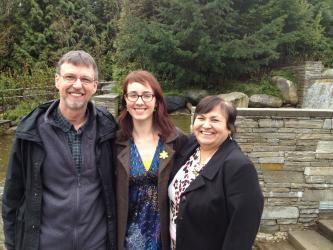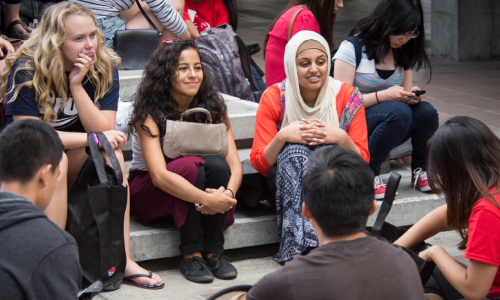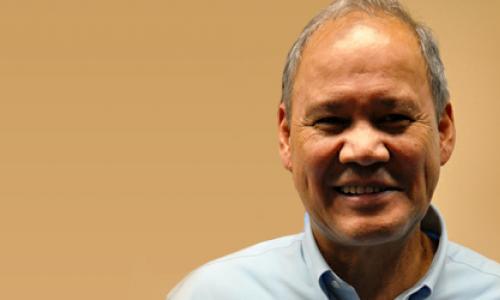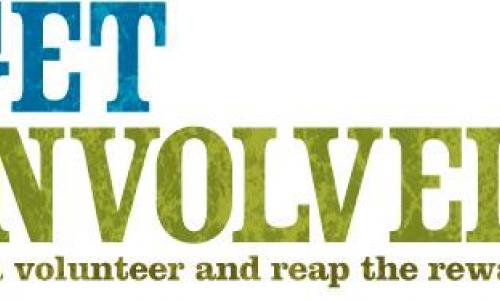
The Indigenous Research Institute promotes research in areas related to Indigenous peoples — in particular, the Aboriginal peoples of Canada — and in a larger context, those of the global community, and facilitates community-based projects with Indigenous partners. The Institute promotes research by bringing together the expertise of Indigenous individuals, groups, and organizations with that of the academic community, to engage in work that meets goals and objectives that is specified by and meaningful to both Indigenous and academic individuals and groups. A meaningful aspect of this process will be the facilitation of communication between Indigenous individuals/communities and the university. The Institute will also promote collaborative research projects within the university and will seek and support internal and external funding for the promotion and pursuit of such research.
Here is one of the IRI's members: Marena Brinkhurst
Marena Brinkhurst: Interdisciplinary and intercultural approaches to community-based land-use planning
When master’s student Marena Brinkhurst joined the Resource and Environmental Management (REM) program, she knew that she wanted to research land policy and planning on First Nations reserves, and she chose REM because of its interdisciplinary and applied approach to addressing complex environmental and natural resource issues. What she did not anticipate was the extent of intercultural learning and personal reflection she would gain from her research on Aboriginal community planning.
My passion is land policy – land tenure, land rights, land law, land management, you name it! If it is about land, I’m interested. I think human relations to land and land use are a fascinating arena for studying how individuals and societies interact with the environment and each other. For my master’s research I was interested First Nations’ reserve land management because this is undergoing substantial institutional and governance changes as more and more Nations establish and enforce their own mechanisms for land-use planning and environmental protection. I hope to contribute to these efforts through my research on the history and contemporary land management implications of the reserve land tenure system.
My project started when the Comprehensive Community Planning team from the Penticton Indian Band (PIB), in the southern Okanagan, reached out to Simon Fraser University for research collaborators and welcomed my proposal to design a project with them. I spent the summer of 2011 working as an intern with the PIB planning team on a MITACS-Accelerate grant and collaboratively developed my research project, which is ongoing. Spending an entire research season in the PIB community meant that I had an opportunity to build many relationships and friendships with staff and community members. I benefited from both formal training in Syilx (Okanagan) philosophy and community decision-making, as well as informal conversations and intercultural learning with my many community mentors. My research and personal goals and interests have been, and continue to be, profoundly shaped by my experiences with PIB and I carry these experiences and lessons with me in my other classes and activities, including my current part-time work for a planning firm that specializes in Aboriginal community planning.
In addition to my research project, I has been actively involved with student and university organizations, including serving as the Student Senator for FENV in my first year, helping to organize the 2012 Canadian Association of Planning Students national conference (hosted by REM), and representing students on the Senate Committee for University Teaching and Learning, Senate Committee on International Activities, and the Learning Management System replacement project executive committee. I am passionate about having students included in university decision-making and supporting student leadership.
Check out http://about.me/marenabrinkhurst for more on my research and interests.
Bio
I grew up in Nova Scotia and was active in environmental conservation efforts as a teenager. For my undergraduate I studied environmental sciences at the University of Guelph, with a focus on environmental economics and policy. During my undergraduate I became interested in land rights struggles by indigenous and rural communities around the world. As I developed my learning on property rights systems and land management, I turned my focus to Canada and was surprised to learn about the many different land rights systems that exist in Aboriginal communities, in particular on First Nations reserves. I decided to dedicate my master’s research to investigating this land tenure context.
I finished my master’s in the summer of 2013, after which I worked as a community planner with several First Nations in British Columbia and Ontario. In March of this year I started a new position in California with a non-profit called Namati that works on community land rights protection internationally. I am thrilled that my interest in community land rights has come full-circle, from its international beginnings, through my learning and personal development working with First Nations communities in Canada, and now back out to communities around the world. Though I am now working in different contexts, the many lessons I learned from working with First Nations collaborators remain central to my work and it is with deep gratitude and respect I strive to honour them.
What?
My master’s research examined the history and land management implications of federally registered individual land holdings (‘Certificates of Possession’) on First Nations reserves. My project was an exploratory, qualitative case study with the Penticton Indian Band. The study is an empirical exploration of the Indian Act land tenure system from local, intra-Band land management and planning perspectives. To broaden my discussion I also include history and experiences from other Bands and Canada generally. I document the history and evolution of the Penticton Indian Band’s land tenure system and explore relationships between land tenure, use, management, and planning.
My research project illustrates the complexity of how this land tenure system developed, through a history of resistance, coercion, manipulation, and adaptation. In particular, my findings focus on the numerous and influential ways that the individual landholding system impacts reserve land use, management, and planning, and ways in which communities are adapting to the management challenges they create. I identify strengths and challenges of the individual landholding system and discuss potential changes to the system and land management more generally.
My findings point to the need for a range of options to address reserve land tenure and management issues. In particular, I highlight the need for First Nations to match their land management approaches with the institutional characteristics of their land tenure system. First Nations that use the Indian Act land tenure system without other available land management tools risk creating or exacerbating local land management gaps and challenges. I discuss ways that Bands can address challenges related to individual landholdings and so strengthen their local land management. I also discuss ways that the Canadian government and other actors can support First Nations’ local land management efforts. These findings highlight that while the current debate over land tenure reform on reserves is an important one, it is only one piece of a larger land management system that requires reform informed by local experiences.
When?
My research project spanned January 2011 – May 2013. I did my fieldwork with the Penticton Indian Band in the summer of 2011, with repeated visits back after that for interviews and community sessions.
Who?
My research project was a collaboration with the Penticton Indian Band’s Land Department and Community Planning team. Community members also participated as interviewees.
Why?
I was drawn to this topic because of my interest in property rights debates, particularly around individual and communal land tenure. As well, there is an ongoing debate in Canada concerning the individualization of land tenure on First Nations reserves, most recently sparked by the proposed First Nations Property Ownership Act, which would give First Nations the choice to opt in to the authority to determine their own local land tenure system. This authority would mean, among other things, that a First Nation could decide to make land holdings on their reserve into ‘fee simple’ – the type of private property that exists off-reserve – if they chose to. This possibility has met with a great deal of concern from many First Nations. In light of this debate, I wanted to learn more about the current system of individual land holdings that exists under the Indian Act, in particular how it evolved and how it impacts land use and management today. There is very little published literature available on this topic.
Where?
My project was a case study with the Penticton Indian Band, in Penticton in the Okanagan Valley, in what is today southern British Columbia. I also looked at other reports and research from other First Nations in British Columbia and elsewhere in Canada. My project also involved significant archival research, which I did in the National Archives and the research library of the BC Indian Chiefs in downtown Vancouver.
How?
In collaboration with the Lands staff at the Penticton Indian Band, I designed my research project around primarily qualitative research methods. The project was exploratory, so we wanted to use an open-ended approach that collected a wide range of stories without trying to fit them into a specific model or testing them through a survey. I interviewed 21 community members, Band staff members, and Band Council members. I took notes in each interview and then would confirm my notes with the participants. I also organized several community sessions for group discussions.
In addition to qualitative information from interviews, I collected contemporary and archival documents from PIB’s records and records in the National Archives, and spatial information from archival maps and current GIS data. I also collected quantitative data on current land holdings from Aboriginal Affairs and Northern Development Canada.
Using these various sources of information, I used qualitative coding to group facts, stories, and comments by theme to extract overarching findings. One set of findings focused on the historical evolution of the individual land holdings on the Penticton reserve lands, and the other set focused on past and current land management implications of the individual land holding system. I reviewed my draft findings with my collaborators at the Penticton Indian Band as well as study participants. Once they were finalized, with my collaborators and supervisor I co-authored two papers describing my research process and findings. We would like to do another paper as well, informed by the Penticton Indian Band’s current land use planning process.














